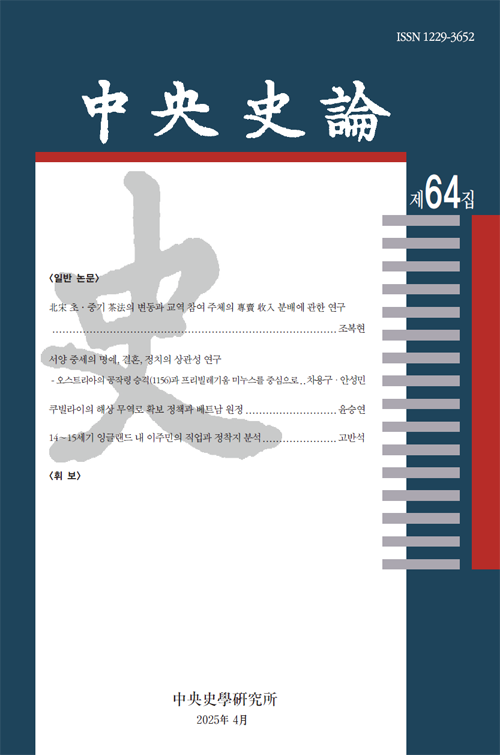北宋초·중기 茶法의 변동과 교역 참여 주체의 專賣收入분배에 관한 연구
Study on the Changes in Tea Laws and the Distribution of Monopoly Revenue Among Trade Actors in the Early and Mid Northern Song Period
- 중앙대학교 중앙사학연구소
- 중앙사론
- 제64집
-
2025.045 - 48 (44 pages)
-
DOI : 10.46823/cahs.2025.64.5
- 12

중국에서 본격적으로 전매제를 시행한 것은 북송시기라고 할 수 있다. 북송은 건국된 직후부터 차에 대해서 전매제를 확대하여 그 수입이 太宗時期에 이미 400여만 貫에 이를 정도였다. 그런데 북송 초기에 남중국으로 통일을 확대해 가면서 북송은 점차 거란에 대해 수세에 몰리게 되었고, 서북방에서는 서하가 세력을 점차 확대하고 있었다. 이에 따라 변경에 중무장한 병력을 많이 배치했고, 이들에게 군수품을 안정적으로 보급하는 것이 중요했다. 송정부는 변방으로 양식과 건초를 보급하는 데 차를 이용하면서 시행 초기 단계에 있던 茶法에 많은 변화가 일어났다. 변경의 형세가 급박해지면 상인들에게 군수품으로 변방으로 보내기 위해 상인들에게 우대하는 조치를 시행했다. 그러나 군수품을 보급한 대가는 대자본가인 交引鋪戶에게 돌아갔다. 이러한 상황을 개선하기 위해 貼射法을 실시했다. 그 효과는 매우 좋아서 정부의 재정을 충실히 하고 군량도 충실히 비축할 수 있었다. 결국 송왕조는 건국 직후 전매제도를 실시한 이후에 여러 가지 차의 전매 정책이 논의되고 교대로 시행되다가 최종적으로 백성들이 자유롭게 판매하고 상인에게 세금을 거두는 통상법을 실시하였다.
It can be said that the Northern Song period marked the first robust implementation of the government monopoly system in China. From soon after its founding, the Northern Song expanded its monopoly on tea, such that by the reign of Emperor Taizong, revenue from tea had already exceeded four million guan. However, as the Northern Song advanced its unification efforts toward southern China during its early years, it gradually found itself on the defensive against the Khitan, while the Western Xia was expanding its influence in the northwest. Consequently, the dynasty deployed numerous heavily armed troops to the frontier, and ensuring a steady supply of military provisions became paramount. As the Song government employed tea to facilitate the delivery of grain and fodder to the frontier, the early-stage chafa (茶法) underwent significant changes. When conditions along the frontier grew dire, the government enacted preferential policies to encourage merchants to transport military supplies to these regions. However, the profits derived from supplying these provisions ultimately fell into the hands of large-scale capitalists known as jiaoyin puhu (交引鋪戶). To remedy this situation, the Tieshefa (貼射法) policy was introduced. It proved highly effective, strengthening the government’s finances and ensuring ample stockpiles of military provisions. Ultimately, having instituted a monopoly system soon after its founding and experimented with various tea monopoly measures, the Song dynasty adopted the Tongshangfa (通商法), which permitted commoners to sell tea freely and levied taxes on merchants.
Ⅰ. 序論
Ⅱ. 交引法의 시행
Ⅲ. 三分法과 四說法
Ⅳ. 貼射法과 見錢法
Ⅴ. 차법의 변화에 따른 이윤 구조의 변동
Ⅵ. 結論
(0)
(0)